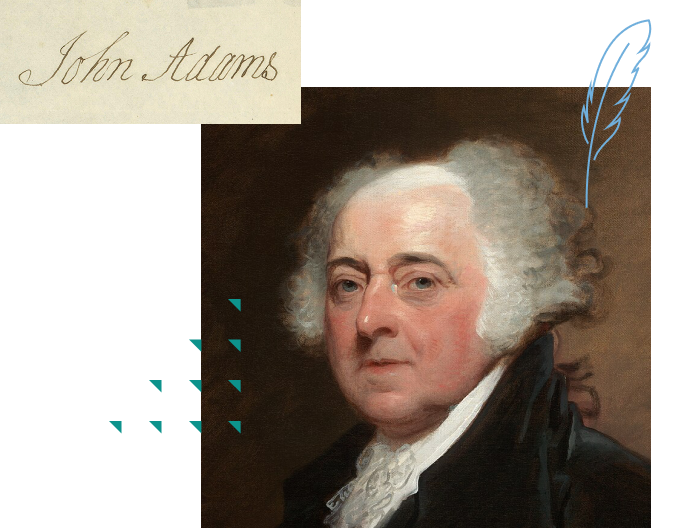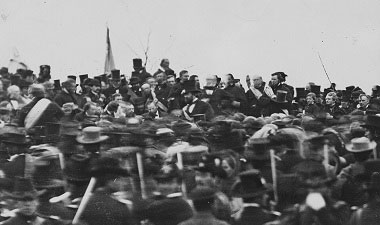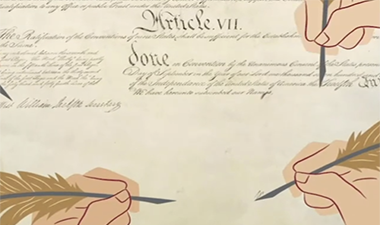Summary
John Adams played an important role in the colonies’ separation from Britain, and he insisted Thomas Jefferson draft the Declaration of Independence. Adams later became the second president of the United States.
John Adams| Signer of the Declaration of Independence
7:08
Biography
John Adams was born on the family farm in Braintree Massachusetts on October 30, 1735, the son of John Adams Sr. and Susanna Boylston Adams. Adams’s father insisted on his son’s education, but according to Adams, it was his mother, not his teachers, who formed his character. He began his schooling at age 6, studying at a dame school–what modern society might call a kindergarten—run by a local Braintree woman. He went on to Braintree’s Latin School, where he disliked the schoolmaster and was frequently truant. At 16, he entered Harvard College where his father hoped he would train for the ministry. He did not. After graduating in 1755, he taught school for a few years while he plotted a course for becoming “a great man,” admired for his honor and reputation. He decided the best occupation to achieve his goals was the law. He returned to Harvard for a master’s degree, read law with James Putnam, and in 1759, was admitted to the bar.
For Adams, law and politics were joined and by 1763, he had published his first essays that were critical of the local colonial elite. Writing as a farmer named “Humphrey Ploughjogger,” he attacked prominent office holders for their selfish pursuit of power. In 1765, Adams, again as Humphrey Ploughjogger, wrote four articles that came to be called “A Dissertation on the Canon and Feudal Law” that justified colonial opposition to the Stamp Act. It proved to be a window onto his personality: intensely combative, brutally honest, full of self-doubt, but equally full of confidence in his cause.
In 1770, Adams was in the political spotlight that followed the violent exchange between British occupying troops and American protestors that came to be known as the Boston Massacre. Adams’s defense led to the acquittal of the soldiers’ commanding officer and six of the soldiers. Although this made him temporarily unpopular among the citizens, anti-British political leaders appreciated that the trial showed Massachusetts’ respect for the justice system in a good light. Not long after the trials, Adams was chosen to fill a vacancy in the Massachusetts legislature. His law practice benefitted as well.
In 1774, Adams was elected a delegate to the First Continental Congress. He and his cousin, Samuel Adams, became the acknowledged leaders of the radical faction that opposed reconciliation with Britain. In early 1775, Adams published his Novanglus essays in which he insisted that Parliament had no authority to legislate for the colonies in any way. By the time the Second Continental Congress met, Adams was known as “the Atlas of Independence.” He influenced the decisions of the congress in significant ways, not only dominating the debate over independence, but nominating Washington to serve as commander of the Continental Army and insisting that Thomas Jefferson draft the Declaration of Independence although he was himself on the drafting committee. Explaining why he proposed Jefferson to write the document, Adams later recalled saying to Jefferson: "Reason first, you are a Virginian, and a Virginian ought to appear at the head of this business. Reason second, I am obnoxious, suspected, and unpopular. You are very much otherwise. Reason third, you can write ten times better than I can."
He was everywhere at once over the next few years of the Continental Congress, helping to shape American foreign policy, heading up the Board of War and Ordnance, and in 1778, joining Franklin in Paris to press France to support American independence. In 1779, he played a major role in drafting the Massachusetts constitution with its bicameral legislature and separation of powers that proved a model for the U.S. Constitution. His “Thoughts on Government” that guided the writing of this constitution was circulated throughout the colonies and served as a major guidebook for drafting other new state constitutions.
Adams’s achievements were many, but his diplomatic skills were few. He was given to explosive outbursts and did not see the value of discretion or compromise, making him a thorn in Franklin’s side at the Peace talks in Paris following Cornwallis’s surrender. Modern historians now suggest that Adams' volatility was the result of a hyperthyroid condition known as Graves Disease. Despite his poor showing of diplomatic prowess, in 1785, he was appointed ambassador to Great Britain. While in England, Adams briefly reunited with his closest friend from pre-war days, the Loyalist Jonathan Sewall. Sewall rightly observed Adams’s diplomatic handicap: His abilities are undoubtedly equal to the mechanical parts of his business as ambassador, but this is not enough. He cannot dance, drink, game, flatter, promise, dress, swear with the gentlemen, and small talk and flirt with the ladies; in short, he has none of those essential arts or ornaments which constitute a courtier.
In 1788, Adams returned to Massachusetts and the life of a farmer. But the new nation had other plans for him. He was elected George Washington’s Vice President, winning 34 electoral college votes compared to Washington’s 69. Adams considered his election “a curse rather than a blessing.” Knowing that the President would operate in a world full of “your Highnesses” and “ Your Lordships”, Adams proposed that Washington be called “Highness”; members of congress preferred the egalitarian term “Mr. President.” For his efforts, Adams was taunted and dubbed “His Rotundity.”
Adams played a minor role in politics as Vice President—and he resented it. "My country has in its wisdom contrived for me the most insignificant office that ever the invention of man contrived or his imagination conceived.” He worried that his role in the Revolution would be forgotten and Benjamin Franklin would be remembered as its hero.
In 1796, John Adams ran for president. His major rival for the position Washington had left was Thomas Jefferson. Alexander Hamilton worried that Adams was too vain, opinionated, and stubborn to heed the advice of Federalist leaders like himself. He preferred Thomas Pinckney. Adams’s view of Hamilton was no less harsh; he judged Hamilton to be “proud-spirited, conceited” and an “aspiring Mortal always pretending to Morality.” The hostility between the two men shaped Federalist politics throughout Adams’ presidency.
Adams’s presidency was dominated by the question of which side to support in the major struggle between France and Britain that arose following the French Revolution. Adams pursued neutrality but all this achieved was that both warring nations labelled the US an enemy and preyed on American ships. Adams sent commissioners to France in hopes of negotiating a new treaty of friendship, America’s honor was insulted by French demands for bribes before negotiations could begin.This diplomatic fiasco was dubbed the XYZ Affair and John Adams became a momentary hero when he called for a military build up in case France invaded. But Adams wanted to avoid a real invasion of American soil and sent a new delegation that achieved its goals with France. The build up of a standing army combined with relentless attacks on the President by Jeffersonians in the press did great damage to Adams’s public image.
Federalists fought back against the Jeffersonian propaganda – and the growth of the Jeffersonian party—by passing a series of laws known as the Alien and Sedition Acts. The Sedition Act made it a crime to publish “false, scandalous, and malicious” writing against the government or its officials. Fourteen individuals and a small number of anti-Federalist newspapers were indicted, but this had little real effect on silencing the attacks on Adams or protecting the Federalist domination of the central government. Adams never employed either of the Alien Acts.
In the election of 1800, Adams lost the presidency to Thomas Jefferson.. His political career was over and he returned to Braintree and to his wife of many years, Abigail Smith Adams, who he had married in 1764. He began work on an autobiography, but did not complete it. After four years in retirement, Adams began to reach out to old colleagues like Benjamin Rush. He was generally silent on events during his rival Jefferson’s administration, and only engaged in a feud with his old friend Mercy Otis Warren who described him as partial to monarchy and too ambitious in her history of the American Revolution. But ultimately, the friendship was renewed. When Jefferson retired in 1809, Adams became less restrained in his political criticism, aiming most of his anger not at Jefferson, but at Alexander Hamilton. Hamilton had died in a duel in 1804, but Adams felt compelled to defend himself against charges the New Yorker had made in 1800.
In 1804, Abigail Adams wrote to Jefferson, sending him condolences on the death of his daughter Polly. There was a brief exchange of letters, but Abigail’s anger at how her husband had been treated in the Jeffersonian press ended the correspondence. It would take until 1812 for the two former Presidents to reconcile. Benjamin Rush, a friend to both men, encouraged them to restore their friendship. When Adams tried to discuss their political history, Jefferson refused. Instead, they took up topics like philosophy and offered accounts of their current daily lives. Although the correspondence grew less frequent, the friendship was fully restored. On July 4, 1826, 93-year old Adams died of a heart attack. His last words were “Thomas Jefferson survives.” But it was not so; Jefferson had died several hours earlier.








